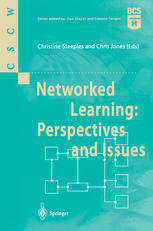

Most ebook files are in PDF format, so you can easily read them using various software such as Foxit Reader or directly on the Google Chrome browser.
Some ebook files are released by publishers in other formats such as .awz, .mobi, .epub, .fb2, etc. You may need to install specific software to read these formats on mobile/PC, such as Calibre.
Please read the tutorial at this link: https://ebookbell.com/faq
We offer FREE conversion to the popular formats you request; however, this may take some time. Therefore, right after payment, please email us, and we will try to provide the service as quickly as possible.
For some exceptional file formats or broken links (if any), please refrain from opening any disputes. Instead, email us first, and we will try to assist within a maximum of 6 hours.
EbookBell Team

0.0
0 reviewsThe area of networked learning (learning in which information and communications technology (ICT) is used to promote connections between people and resources) is wide and growing in importance, especially in further and higher education. It offers the opportunity to offer more flexible access to learning programmes over time and space, but not enough is yet known about exactly what it can offer and how best to ensure that institutions maintain and improve the quality of the learning experience. This book focuses on the key issues which anyone involved with the use, administration, or study of networked learning will need to know about. These include policy issues, the costs of networked learning, staff development issues, and the student experience. With contributions from authors based in Europe and the US and Australia, it offers a global perspective which is designed to inform professional practice and its administration. It will be essential reading for practitioners and researchers in higher education and learning technology and will be of interest to policy-makers and managers in HE academic administration. It will also be relevant to learning technologists and support staff, who may not have direct involvement with teaching but still need to understand the opportunities and issues presented by networked learning, and also to students and researchers in education and social science. "The list of authors reads like a "Who's Who" of Networked Learning" (Professor Diana Laurillard, OU, UK).